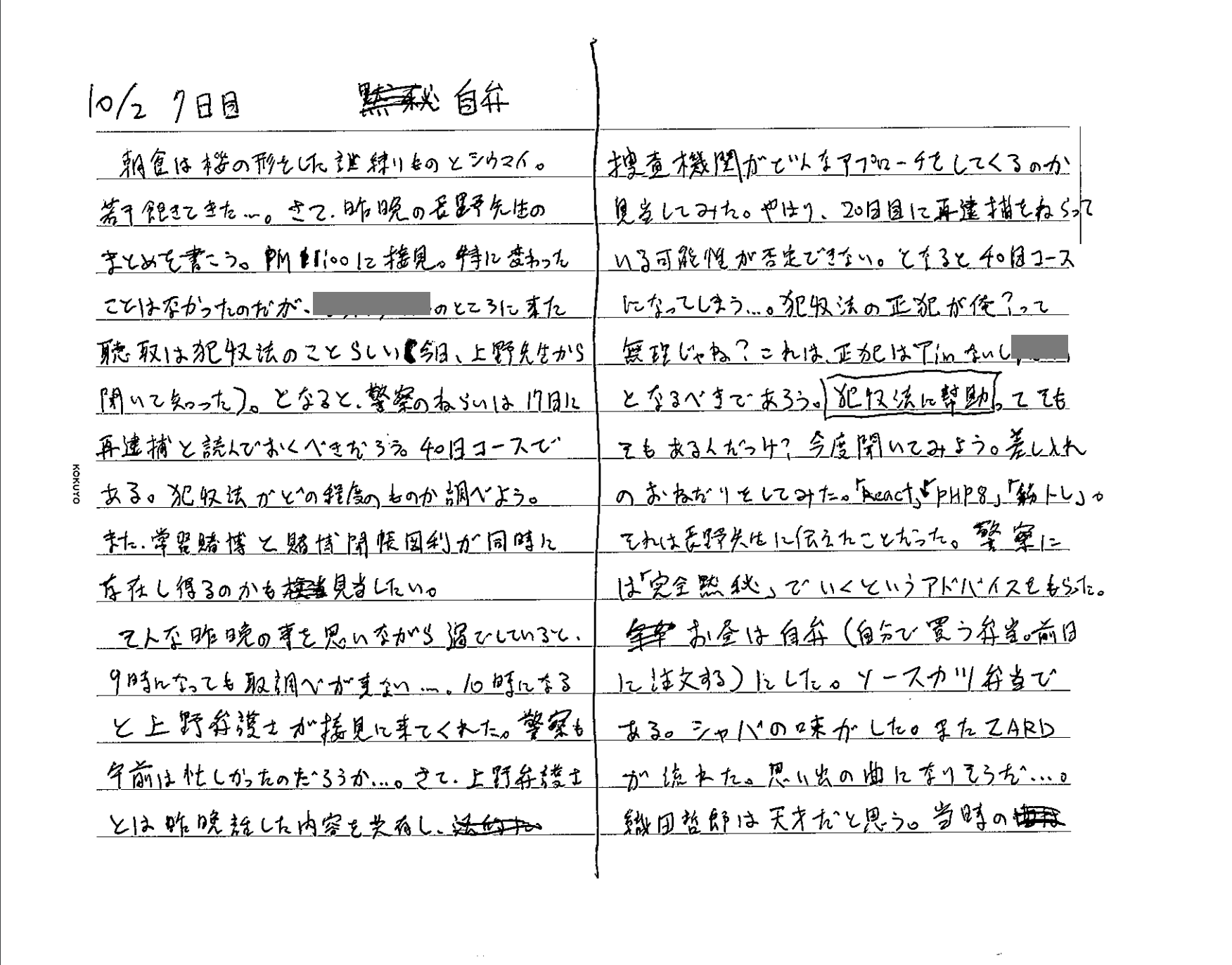I’ve decided to comment on my diary. It seems I was particularly verbose on this day, writing about four times more than usual.
Reflections on My Diary
The diary mentions:
• “If I don’t speak, the investigation will extend to others.”
• “If I don’t comply with giving a statement, they’ll go after former staff.”
• “Fulfill your duty as the representative (?), or else…”
These were indeed statements made by the detectives, and I want to explain them with a sense of realism.
First, the phrases:
• “If I don’t speak, the investigation will extend to others.”
• “If I don’t comply with giving a statement, they’ll go after former staff.”
These weren’t said as bluntly as written. The detective’s actual words were more nuanced but conveyed a similar threat: “You know, if you keep maintaining your silence, we’ll have to look into others around you more deeply. I think it would be better if you just talked.”
This was understood as a veiled threat of extending the investigation to others, and it struck me enough to write about it in my diary. This is typical of police interrogations. I think the detective, desperate to break my silence, unintentionally revealed his frustration through this combination of suggestion and threat. He seemed like a decent person, probably indoctrinated into the organization’s “pure” mindset (with a touch of sarcasm).
The phrase “fulfill your duty as the representative (?), or else…” came from Detective T, who was behind the lead investigator, Detective F. Detective T appeared to have a strong sense of justice, often leading to stalemates in our conversations. I believe he was even more deeply indoctrinated into his role as a detective.
His logic seemed to be:
• “Maeda should tell the police’s version of events because he’s been arrested, implying he’s guilty.”
• “Maeda, as the representative of many staff members and involved in an incident, has a duty to take responsibility and resolve the situation.”
His approach was based on the assumption that I knew I had done wrong and should confess everything truthfully. However, from my perspective, the starting point was wrong. The question was whether this should even be considered a crime and whether the arrest was justified. This was always a point of contention. They want to obtain my phrase like this:
“I took full control of everything; I’m sorry. I will completely change my mind due to the detectives and tell everything.”
To me, it seemed like they were demanding that I take responsibility, which translated to upholding the police’s honor.
In the end, in that closed environment with no recording or lawyers present, the detectives reiterated:
“Breaking your silence will resolve this quickly and be in your best interest.”
自弁2
自らの日記について言及することにする。この日は筆がのっていたのか、通常の4倍ほどの文章を認めることになったようだ。
- 私が喋らないと他に捜査が及ぶ
- 私が話し調書に応じないと元スタッフのところに行く。
- 代表としての義務を果たせ(?)さもないと?
と記されている箇所があるのだが、この3つは刑事に確かに言われたことなので臨場感を持って解説したいと思う。
まず、
「私が喋らないと他に捜査が及ぶ」
「私が話し調書に応じないと元スタッフのところに行く。」
は文字通りというわけではなく、多少遠慮がちに言っていた。当然、内容は「不正捜査」で間違いないのだが、実際はこのように言っていた。
「ねぇ、前田さんもずっと黙秘のままだと、こっちも色々周りのこともさらに調べていかないといけないしさ、僕は(前田が)早く喋った方がいいと思うけどなぁ。」
つまり、僕が黙秘を破らないとさらに色々な人の供述を取ったり強制捜査することになると言っていると受け止め驚異に感じたので日記に書いた。これが警察の取調べである。僕はフェアなのでさらに臨場感を足すと、この刑事は僕の黙秘を必死で破りたくて隠しきれない思いを「仄めかし」と「脅し」として表してしまったのだと思う。人が良さそうではあった。組織に洗脳された「真っ白」な人なのだろう(少し皮肉を込めてしまったが)。
そして、
「代表としての義務を果たせ(?)さもないと?」
であるが、取調べの主任F刑事のの後ろにいたT刑事だ。より正義感が強そうな彼とはよく話が平行線になった。こっちはもっと真っさらに仕上げられて刑事になったのだと思う。彼の心理とロジックを詳細に分析した感じはこうだ。
前田は事件を(警察の筋書き通りに)話すべき。捕まっているのだから悪い人なんだ。
前田はたくさんのスタッフを抱えて事件にもなっているんだから、代表として話してこの事件のケジメをつける義務がある。
彼の切り口が、あなたは悪いことをした自覚があなたにはあるはずなのだから全て正直に話せというロジックだった。なのだが、こちらからすれば最初から認識がズレている。そもそも、これが事件になるべきなのか、逮捕理由に正当性を書くという立場だ。これはずっと平行線である。また、警察によってこのような状況にされている僕には、ケジメをつける = 警察の面子を立てろと言われているとしか聞こえない。おそらく僕が100点を取れるとしたら、
「僕が全部主導してやりました、すみません。刑事によって心を入れ替えて全てをお話しします」
と発言することだっただろう。
そして、録音録画もない、弁護士の立ち会いも認められない閉鎖空間の中、刑事達は僕に再度告げた。
「黙秘を破る事が早く終わるし、前田さんのためにもなる。」




Comments